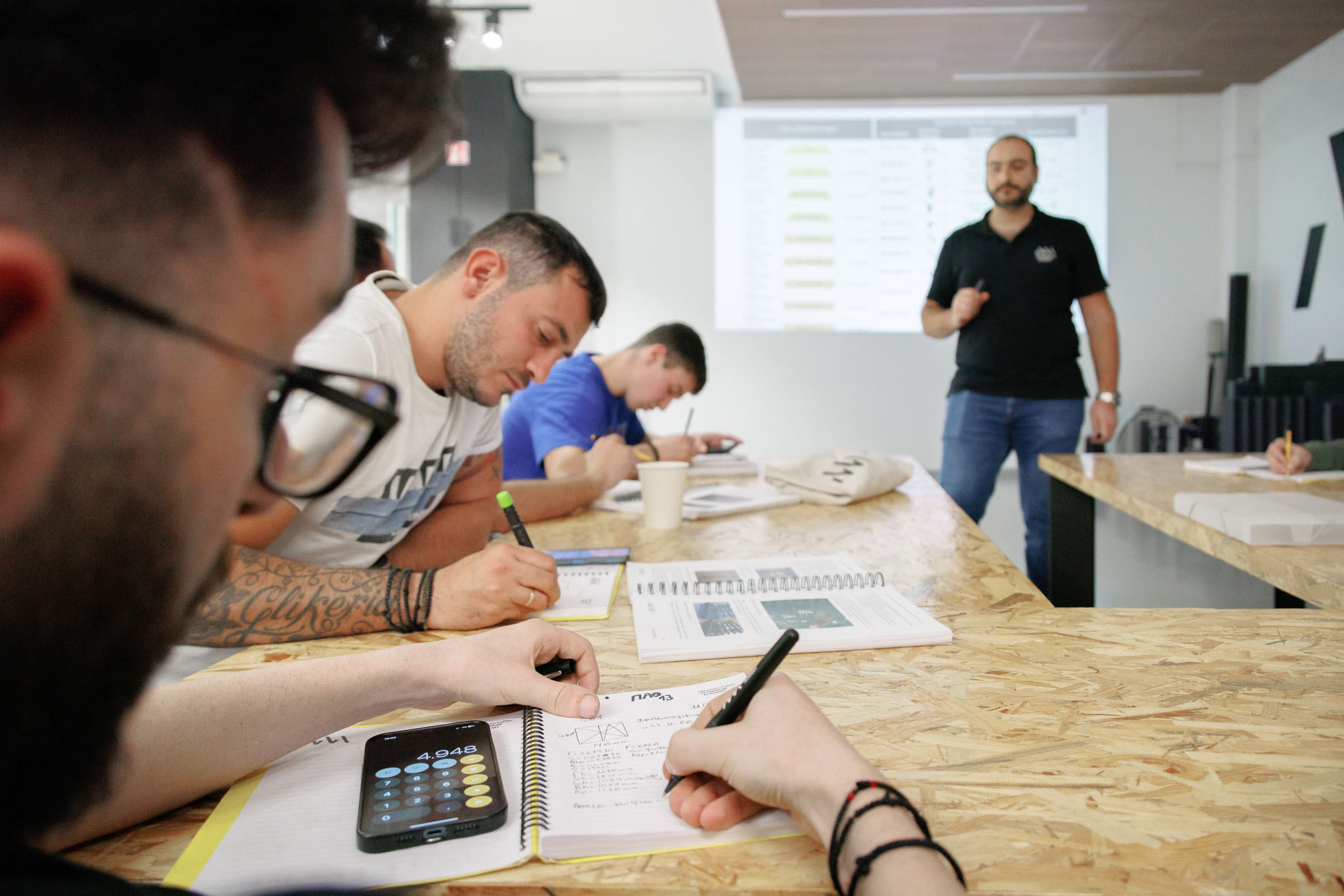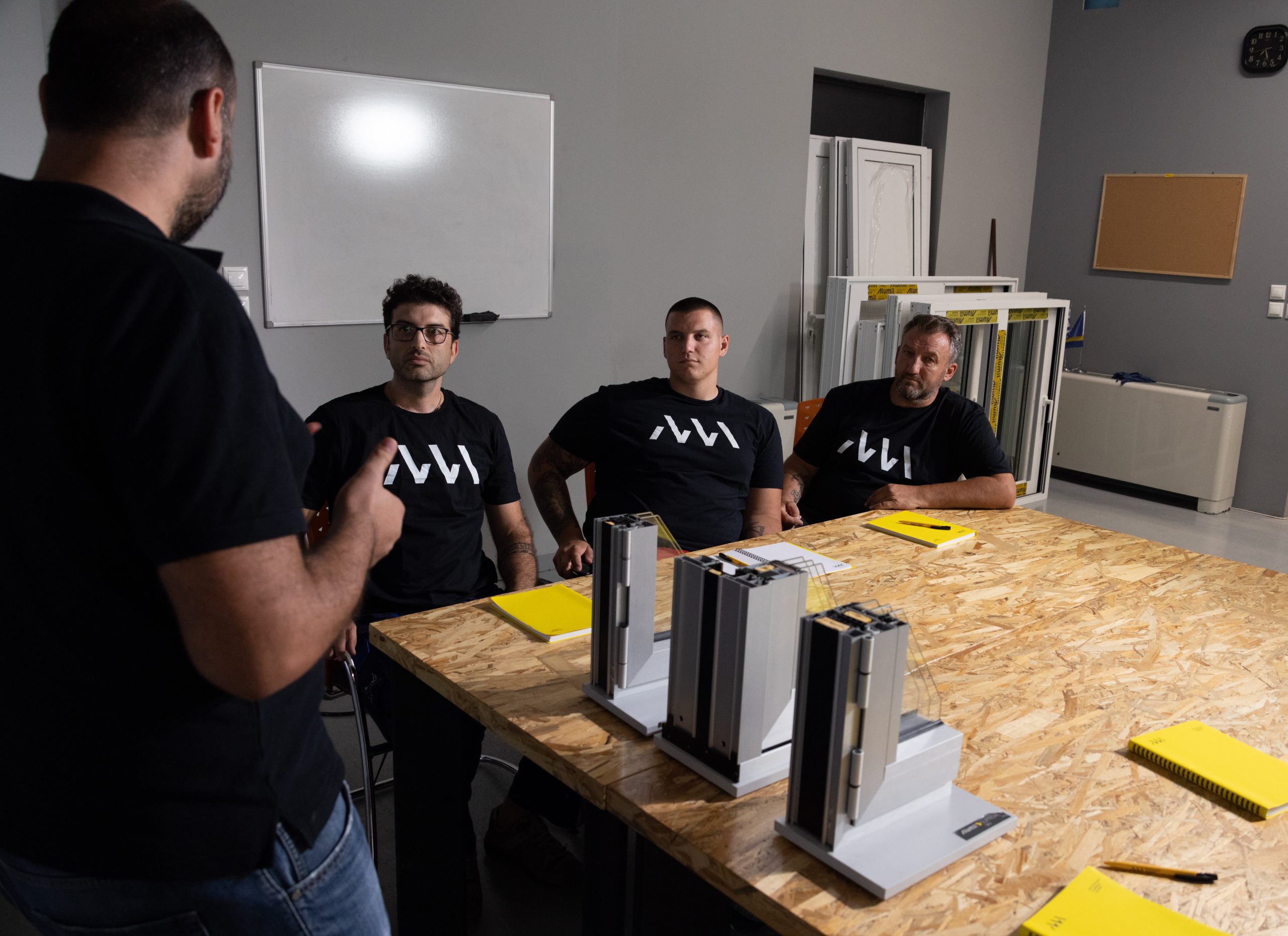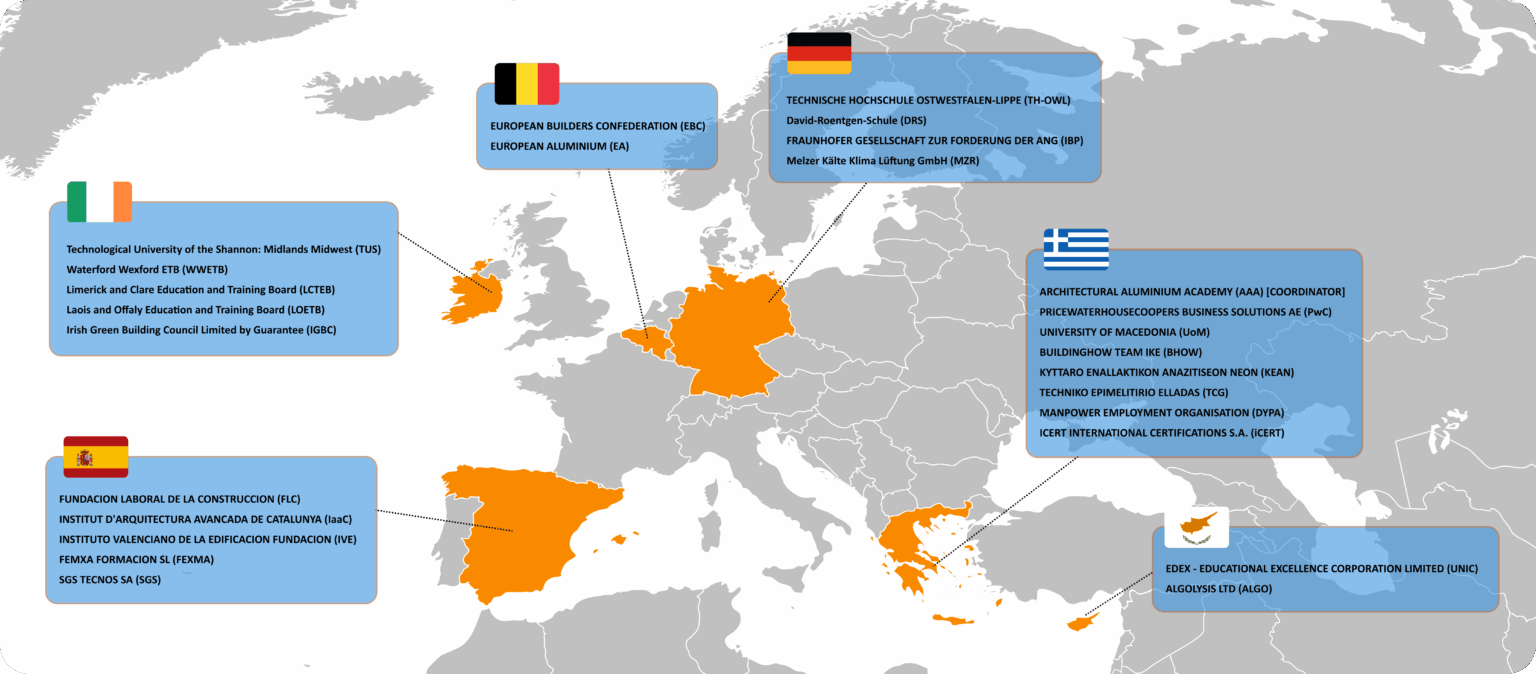About

Project Background
The Architecture, Engineering, and Construction (AEC) sector is undergoing a transformative shift as global urbanisation accelerates and the building stock is set to double by 2060. While this growth presents vast opportunities, projected to reach €13.07 trillion by 2037, it also exposes critical challenges, including a looming labour shortage, environmental impact, and lagging digitalisation. With 75% of buildings in the EU still energy inefficient and construction responsible for 35% of total waste, the sector must urgently adopt circular and low-carbon practices. Innovations such as digital building logbooks and advanced reuse technologies offer up to 80% emissions reduction, but their uptake is slowed by a persistent skills gap. Addressing these issues is essential to ensure a sustainable, efficient, and future-ready built environment.

Objectives


European Sustainable Development Goals (SDGs)
1
To establish innovative Centres of Vocational Excellence (CoVEs) networks for construction skills across 4 European countries comprising VET providers of EQF Levels 3-8, professionals’ associations, enterprises, competence centres, research and academic institutions, and policy stakeholders
2
To establish a transnational collaboration network of Centres of Vocational Excellence (CoVEs) according to the bespoke needs of the construction industrial ecosystem based on innovative approaches to tackle economic and societal challenges that are affected by the workforce objectives composition and the future practices of construction professionals
VET EU Policy Objectives
3
To equip young people and adults with the necessary knowledge, skills, and competences to thrive in the evolving labour market and society.
4
To deploy state-of-the-art infrastructure and digitalization strategies in VET institutions. INSIDE-CoVE will support VET providers’ efforts to access appropriate digital equipment and infrastructure.
.
5
To embed environmental and social sustainability principles into both program content and organisational management. By doing so, vocational education and training institutions contribute to the implementation of the United Nations Sustainable Development Goals (SDGs).
6
To foster inclusiveness and equal opportunities ensuring that all individuals, regardless of their background or circumstances, have access to quality education and training.
Activities
INSIDE-CoVE transforms vocational education and training (VET) for the construction sector by developing future-ready skills and inclusive approaches. It creates innovative curricula, builds business-education alliances, and promotes an entrepreneurial culture. The project also explores sustainable financial strategies for Centres of Vocational Excellence across Europe.
Innovation and Technology
INSIDE-CoVE enhances learning experiences by leveraging advanced technologies. It uses knowledge triangles, dynamic ecosystems, blended learning, extended reality (XR), virtual reality (VR), augmented reality (AR), mixed reality (MR), and integrates AI and automated feedback systems. Additionally, it develops a digital platform (iLMS) for curriculum delivery and promotes engagement and understanding through interactive tools.
Regional and International Impact
Our project has a strong regional and international dimension, with specific focus areas in different countries. In Greece, the focus is on the aluminium value chain; in Spain, digital construction; in Germany, smart buildings; and in Ireland, green buildings and the circular economy. The project also aims to expand national CoVEs and build capacity to attract more partners, elevate VET perception, and attract more learners.
Quality Assurance and Sustainability
We ensure the highest quality of outcomes through continuous evaluation and alignment with European standards. This includes regular audits, self-evaluation, peer reviews, engagement with National Reference Points (NRPs), and alignment with EQAVET. Our sustainability plan involves developing sustainable business models and funding opportunities, capacity building for VET centers and continuous monitoring.

Who does the project speak to?
The INSIDE-CoVE learning target groups (LTGs) extend to blue-and white-collar workers of the Architectural, Engineering and Construction sector. Based on the Construction Bluepring and the NET-Ubiep BIM Qualification Models, and aligned with the EQF levels 3-8, the key learning target groups include:
LTG1
Technicians & Associated Professionals
mostly related to on-site construction works (e.g., builders, plumbers, electricians etc.)
(EQF Level 3+)
LTG2
Plant & Machine Operators
mostly related to manufacturing and prefabrication for both on- and off-site work
LTG4
Project Managers
planning, coordinating, and overseeing construction projects from inception to completion.
(EQF Level 4+)
LTG5
Building Administrators
facility managers, smart building operators, and BMS managers
(EQF Level 3+)
LTG6
Public Administrators
public procurement officers, digital permit officers
(EQF Level 4+)
LTG3
Professionals
architects, engineers, planners, surveyors, and designers
(EQF Level 4+)
National CoVEs
Each National Centre of Vocational Excellence plays a crucial role in achieving the project goals and meeting the needs of the construction sector, in line with regional EC RIS3 strategies.

INSIDE-CoVE in Spain
In Eastern Spain, particularly in Catalunya and Valencia, the focus is on Industry 4.0, advanced manufacturing, and robotics to support the digitalisation of construction. Key elements include robotic 3D printing and drone applications for infrastructure and building maintenance, which are priorities in Valencia's RIS3 strategy. The Spanish CoVE highlights cutting-edge technologies for digitalised construction, integrating robotics, 3D printing, and Building Information Modelling (BIM) with computational design. This approach is essential for developing skills in building digital twin technologies and automation, particularly in the clusters of Barcelona and Valencia represented in the INSIDE-CoVE project.
INSIDE-CoVE in Greece
In Attica and Central Macedonia, the RIS3 strategy emphasises the energy-saving potential of the aluminium value chain. This includes re-skilling the workforce for the entire building cycle: design, fabrication, installation, operation, decommission, and reuse. The focus is on smart-building technologies like smart windows, energy-generating building integrated photovoltaics facades, and dynamic ventilation systems. The Greek CoVE prioritises aluminium architectural systems due to their significant importance in Greece. As the leading producer of bauxite ore and ranking seventh in primary aluminium production in Europe, Greece integrates the aluminium value chain into innovative construction and renovation strategies for the building sector.
INSIDE-CoVE in Ireland
The S3 priorities for Ireland focus on enhancing national research and innovation, particularly in sustainable and green innovation for SMEs. Existing collaborations advance energy efficiency and green transition, with further enhancement between nZEB Centres of Excellence and Technological Universities to upskill the construction industry in green and circular skills. Despite ranking fifth in IT and digital economy among 27 EU member states, Ireland faces challenges in maintaining a skilled workforce for emerging digital technologies. The Irish CoVE will concentrate on green buildings and circular construction, emphasising energy efficiency and sustainability throughout the building lifecycle. Key concepts include reuse and recycling of materials, Life Cycle Assessment, design for disassembly, and Digital Product Passport for skills building.
INSIDE-CoVE in Germany
The S3 for Germany prioritises digital economy and society skills, focusing on Industry 4.0, smart services, smart data, cloud computing, digital networks, digital science, digital education, and digital life worlds. It also prioritises innovative work environments aligned with smart buildings, requiring e-skills and digital competences for facility management and data-driven workplace operations. In Rhineland-Palatinate, the focus is on sustainable economy and energy, calling for skills in energy research, storage, grids, photovoltaic construction, energy-efficient cities, green economy, bioeconomy, future city, future construction, and sustainable consumption. The German CoVE integrates smart buildings, innovative facades, energy-saving systems, and green building envelopes. It includes advanced building management, automation, smart home, and IoT applications. Additionally, it provides insights for digital construction sites and building twins, contributing to the INSIDE-CoVE future-oriented approach.
